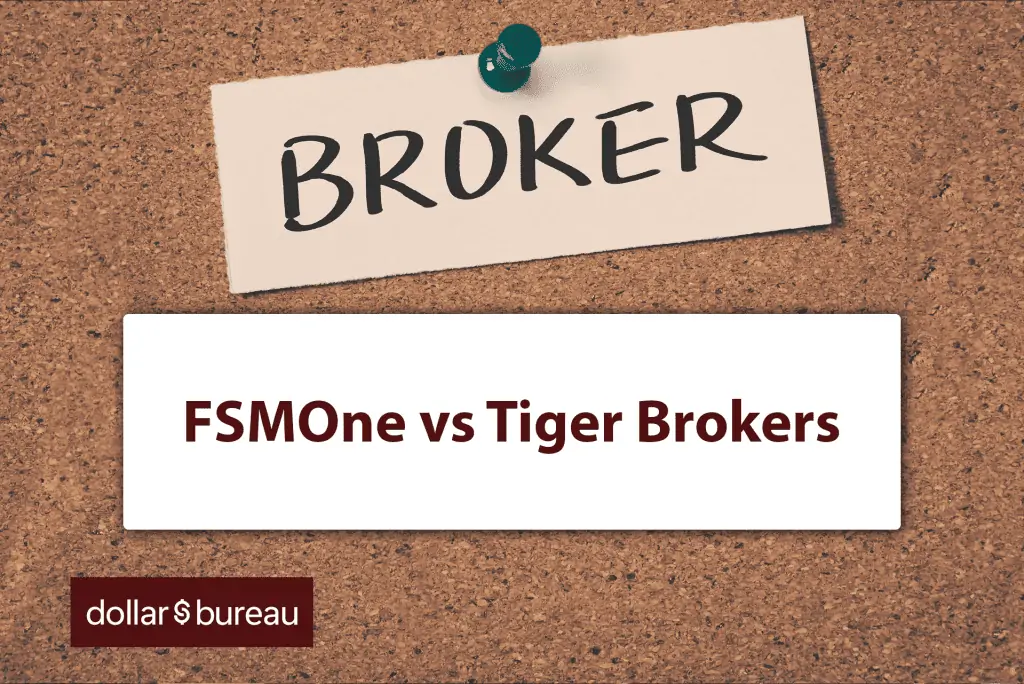Established in 2008 and 2014 respectively, FSMOne and Tiger Brokers are popular online brokerages for Singapore investors.
This article overviews the differences between the brokerages to help you decide which one is better for you.
Markets Offered by FSMone vs Tiger Brokers
Both FSMone and Tiger Brokers allow users to trade in the following markets:
- Singapore Exchange (SGX)
- Chinese stock market (Shanghai/Hong Kong Stock Exchange)
- US stock market (New York Stock Exchange, Nasdaq Stock Market, American Stock Exchange)
Tiger Brokers, however, offers 2 additional markets – Australian Exchange (ASX) and the London Stock Exchange (LSE), while FSMOne’s additional market is the Bursa Malaysia Market (KLSE)
Snapshot
FSMone— Singapore, Hong Kong, China, USA, Malaysia
Tiger Brokers— Singapore, Hong Kong, China, USA, Australia, United Kingdom
Main takeaways
Both offer the same number of exchanges, but Australia’s and United Kingdom’s exchange is more in-demand than Malaysia’s for most Singapore investors.
Which one is better?
Tiger Brokers is a better option than FSMOne for investors who are after securities listed on the Australian and UK exchanges.
If however, you wish to invest in the Malaysian stock exchange especially, you should choose FSMOne as this market is not offered by Tiger Brokers.
Tradable Asset Classes Offered by FSMOne vs Tiger Brokers
FSMOne users can trade the following assets:
- Stocks in all covered markets
- Funds
- Exchange-traded funds (ETFs)
- Daily leveraged certificates
- Structured warrants
- Bonds
- Insurance
- Managed portfolios
Tiger Brokers offers the following:
- Long or short stocks for all markets
- ETFs
- China A-shares
- Real estate investment trusts (REITs)
- Callable bull/bear contracts (CBBCs)
- Warrants
- Futures (index, metal, forex, equity, treasury, energy, agriculture, and Bitcoin)
- Options
Tiger Brokers also has a Fund Mall that offers investors a variety of mutual funds to purchase.
Snapshot
FSMOne— stocks, ETFs, mutual funds, managed portfolios, bonds, insurance, warrants
Tiger Brokers— stocks, ETFs, REITs, ADRs, CBBCs, mutual funds, futures, options, warrants
Main takeaways
Both FSMOne and Tiger Brokers offer a wide range of asset classes.
Which one is better?
If you are a new investor and you wish to opt for more basic investment assets such as ETFs, mutual funds, bonds, and stocks, both are lets you do that.
If you prefer to have an experienced financial advisor manage your funds by putting put your money in a managed portfolio, then FSMOne may be a better option for you.
We can’t vouch for the quality of their financial advisors, but we can vouch for our financial advisors.
If you are a seasoned investor or you would like the diversify your investment assets, then Tiger Brokers may be a better fit for you as it offers a much wider range of investment products.
Commissions and Fees Charged by FSMOne and Tiger Brokers
In general, Tiger Brokers offers more competitive transaction fees compared to other online brokers.
Both FSMOne and Tiger Brokers charge a trading commission fee— charged any time you trade on the platforms i.e. buy or sell a tradable product. Both brokers also charge a platform fee— a fee for using their service.
The fees vary depending on the specific market and type of product traded. The brokers do not charge withdrawal fees, account maintenance, or inactivity fees.
US market Stocks and ETFs Fees: FSMOne vs Tiger Brokers
| Tiger Brokers | FSMOne | |
| Commission |
|
|
| Platform fee: |
|
|
| External: |
|
|
Snapshot
FSMOne— at a minimum you will incur USD 8.80 per trade.
Tiger Brokers— at a minimum you will incur USD 1.99 per trade.
Main takeaways
For trades on the US stock market, Tiger Brokers’ fees are significantly cheaper than those for FSMOne.
Which one is better?
If you are planning to conduct most of your trades on the US stock market, then Tiger Brokers is by far the cheaper option.
P.S. The cheapest in the market right now for US stocks and ETFs is Syfe Trade.
Hong Kong Market Stock Fees: FSMOne vs Tiger Brokers
| Tiger Brokers | FSMOne | |
|---|---|---|
| Commission |
|
|
| Platform fee: |
|
|
| External: | Hong Kong
|
|
Snapshot
FSMOne— at a minimum you will incur HKD 50.00 per trade.
Tiger Brokers— at a minimum you will incur HKD 15.00 per trade.
Main takeaways
For trades on the Hong Kong market, Tiger Brokers offers much cheaper rates than FSMOne.
Which one is better?
If you are planning to conduct most of your trades on the Hong Kong or Chinese stock market, then Tiger Brokers may be a better option for you.
Singapore Market Stocks and ETFs: FSMOne vs Tiger Brokers
| Tiger Brokers | FSMOne | |
| Commission |
|
|
| Platform fee: |
|
|
| External: |
|
|
Snapshot
FSMOne— at a minimum you will incur SGD 8.80 per trade.
Tiger Brokers— at a minimum you will incur SGD 2.88 per trade.
Main takeaways
For trades on the Singapore stock market, Tiger Brokers offers significantly cheaper trade fees than FSMone.
Which one is better?
If you are planning to conduct most of your trades on the Singapore stock market, then Tiger Brokers may be a better option for you.
Fund Fees: FSMOne vs Tiger Brokers
Tiger Brokers currently has a zero fee promotion to buy and sell from is Fund Mall, the promotion is valid until the 30th of June 2022.
Stock and Hybrid Funds:
| Tiger Brokers | FSMOne | |
| Commission |
|
|
| Platform Fees |
|
|
Snapshot
FSMOne— 0% sales charge but fees starting at 0.05%
Tiger Brokers— Usually 1.20% sales fee for stock/hybrid funds and 0.80% fee for bond funds. No platform fee.
Main takeaways
Although FSMOne has a quarterly platform fee, it has no sales fees, making it a cheaper option than Tiger Brokers.
We did some calculations and found that if you’re holding these funds for around 20 years, FSMOne will charge more as you’re charged per quarter.
However, this assumes that you don’t rebalance your portfolio for 20 years.
Considering rebalancing, FSMOne will still be cheaper as Tiger Brokers will charge you a sales fee every time you need to rebalance.
Which one is better?
If you are planning to mostly purchase into funds then FSMOne is a cheaper option than Tiger Brokers.
Promotions and Extras: FSMOne vs Tiger Brokers
Tiger Brokers also offers attractive sign-up promotions such as commission-free trades. Additionally, Tiger Brokers enrols investors in its Tiger Coin rewards program.
Tiger Coins can be used to redeem rewards like free stock vouchers, commission-free trades and more, which can be used to offset commissions.
FSMOne also has regular rewards and a referral rewards program.
FSMOne regularly runs investment promotions, though the duration of the promotions is short and the number of eligible recipients is limited. For example, valid until 29 April 2022:
- The first 100 investors to open an FSMOne account get 3 free trades for select ETFs.
- Investors who link their CDP account (a Singapore holdings account) to their FSMOne account get a 0% processing fee for their first CDP sell trade.
- Investors can earn up to 40,000 FSM rewards points if they position their investments with select funds and ETFs.
Snapshot
FSMOne— Promotions are available and subject to change.
Tiger Brokers— Promotions are available and subject to change.
Main takeaways
Both FSMOne and Tiger Brokers may offer promotions.
Which one is better?
Promotions are of course temporary and should not be the main deciding factor for whether you choose FSMOne or Tiger Brokers. It is highly advised to check their official websites for the most up to date information before you sign-up.
Funding and Withdrawal Options: FSMOne vs. Tiger Brokers
Sign-up is fast and easy for both FSMOne and Tiger Brokers.
Both platforms will require you to deposit into your account before you can begin making trading transactions, but they do not require a minimum sum to maintain an active account.
Both FSMOne and Tiger Brokers offer funds deposits with Fast And Secure Transfers (FAST), an electronic funds transfer service that allows users to transfer SGD from one Singaporean bank to another.
In addition, Tiger Brokers offers the option of setting up direct deposit payments if you have an account with DBS Bank or POSB. With this option, funds usually arrive in your broker account within minutes.
Wire transfer from a personal bank account is also possible with both FSMOne and Tiger Brokers. Each platform provides detailed instructions on how to fill out the payment reference form correctly.
FSMOne also offers funds transfer PayNow, a service offered by participating banks that allows transfers of funds between Singapore banks using a mobile number.
If you are based in another country and do not have a Singapore bank account, Tiger Brokers allows you to link your account to the money transfer app Wise to make a deposit.
With Tiger Brokers, deposits may take up to 1-3 days for the funds to arrive in your broker account. It will also take a few days for funds to show up in your bank after withdrawing.
Deposits and withdrawals with FSMOne are almost instant when transferring money into the FSMOne Cash Account if your bank details are verified for SGD. As long as you have funds in the FSMOne Cash Account, you can settle trade transactions in real-time.
The FSMOne account is simply a holding account for trade settlements, it should not be used as a savings or traditional bank account.
Snapshot
FSMOne— FAST, Wire, PayNow, Direct Deposit (Standing Instruction or GIRO)
Tiger Brokers— FAST, Wire, Wise, Direct Deposit with DBS and POSB
Main takeaways
Both FSMOne and Tiger Brokers offer a wide range of deposit and withdrawal options. The time it takes to process deposits and withdrawals may be faster with FSMOne, though this depends on the specific conditions of the transaction.
Which one is better?
Tiger Brokers and FSMOne payment options are very similar.
But if you want the added convenience of having a settlement fund with which to make instant transactions, then FSMOne may be a better option for you.
That being said, when using direct debit, Tiger Brokers transactions are instant too.
I’d say both are pretty much the same.
Safety and Custodians: FSMOne vs. Tiger Brokers
Tiger Brokers and FSMOne both offer a high level of security for your assets. Tiger Brokers is registered with several US financial security corporations including the Financial Industry Regulatory Authority (FINRA), the Depository Trust Company (DTC), the US Securities and Exchange Commission (SEC) and the Securities Investor Protection Corporation (SIPC).
Tiger Brokers is also licensed by the Monetary Authority of Singapore (MAS) and the Hong Kong Securities and Futures Commission.
FSMOne is the Business-to-Consumer division of iFAST Singapore, a subsidiary of iFAST Corp, a leading wealth management fintech platform headquartered in Singapore.
Yes, it’s from the same company when your financial advisor mentions investing for you via iFAST.
iFast Singapore is a Capital Market Services Licence holder and Financial Advisers licence holder, issued by MAS.
It is also a Central Provident Fund-registered Investment Administrator and a Depository Agent of The Central Depository Limited (“CDP”). iFAST is the custodian of FSMOne.
If iFAST Singapore shuts down, iFAST Corp will transfer all assets to another distributor or return them to the investor.
Both FSMOne and Tiger Brokers segregate their client’s assets from their own capital by housing client capital in custodian accounts.
Currently, third-party DBS Bank is the custodian for Tiger Brokers. iFAST is the custodian for FSMOne.
Snapshot
FSMOne— Capital Markets Licence, Financial Advisers Licence
Tiger Brokers— SIPC, FINRA, SEC, DTC, Capital Markets Licence
Main takeaways
Both offer a high level of security for your assets.
Which one is better?
FSMOne has been around for 24 years, much longer than Tiger Brokers. FSMOne is a subsidiary of iFAST, a well-established and long-running financial management company.
This may make it a better option for investors that prefer to invest with a more established broker.
On top of that, iFAST Corp was awarded Runner-Up for the “Most Transparent Company Award” and “Shareholder Communication Excellence Award” at the SIAS Investors’ Choice Awards in 2021.
Also, FSMOne has the option to link your CDP account. This means you can make withdrawals via other brokers too if you need it.
Overall, both are great for custodian-based brokers, but if you need to link your CDP account, FSMOne is the answer.
Platform Usability: FSMOne vs Tiger Brokers
Both platforms offer user-friendly and customisable app interfaces with several sophisticated features.
Tiger Brokers compiles a watch list, prime account page, a stock information page, news, discovery, and free real-time New York Stock Exchange market data page all into one sleek and polished looking app.
The FSMOne web platform is extremely comprehensive with several multi-item drop-down menus. While some users may like the amount of detail, others may find the extensive amount of pages overwhelming.
The FSMOne mobile app is a similar but slightly simplified version of the web platform. Some user reviews report that the FSMOne app is slower and not as user friendly as the Tiger Brokers app.
Both FSMOne and Tiger Broker offer their apps on desktops and Android or IOS.
Main takeaways
Both FSMOne and Tiger Brokers offer resourceful apps. Tiger Brokers however may be easier to navigate.
Which one is better?
If you do not want to dedicate time to figuring out and navigating FSMOne’s complex web platform and mobile app, then Tiger Brokers may be a better option for you.
Customer Support: FSMOne vs Tiger Brokers
Tiger Brokers offers customer service on Telegram, email, Facebook, live chat on the app and phone. Customer support is available weekdays from 9am to 5pm AEST.
Tiger Brokers, however, has received mixed reviews about the timeliness and effectiveness of customer support.
FSMOne has an extensive FAQ page on its official website. It also offers Malaysian client hotline numbers and a customer service email platform.
Snapshot
FSMOne— Phone (Malaysian numbers), extensive helpdesk, and email only.
Tiger Brokers— social media, email, phone, live chat and more.
Main takeaways
Tiger Brokers offers a wider variety of customer support options than FSMOne.
Which one is better?
If you prefer a variety of platforms on which to contact customer support, then you are likely to find Tiger Broker’s customer service experience more convenient.
However, FSMOne has an extensive helpdesk that helps you get through most questions you’ll have easily. This beats the need to call and wait for a customer support officer to get back to you – which we all know can be long.
So if you prefer getting answers quick, FSMOne’s will be better here.
Conclusion
Now that you’ve read our comparison of Tiger Brokers and FSMOne, which will you choose?
Personally, we invest in stocks and ETFs in the Singapore and US markets.
That’s why we prefer Tiger Brokers (and moomoo) instead.
We compare Tiger Brokers and moomoo here.
Oh, and if you’re trading in the US markets solely, Syfe Trade is definitely the cheapest – and we reviewed them here.
However, these are custodian accounts and non-CDP. So if you’re looking for a CDP account, FSMOne wins by default.
If you’re looking to invest in unit trusts, FSMOne wins too as their fees are so much lower than Tiger Brokers.
Ultimately, this depends on your needs.
What are you looking to invest in?
Which markets are you looking for?
CDP or custodial accounts?
Once you know what you’re looking for, you’ll have your answer.










